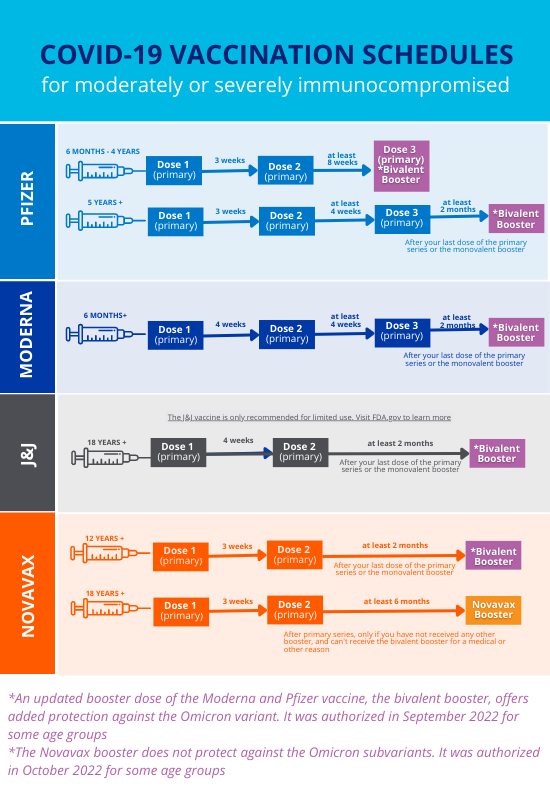Understanding the New “Omicron” Boosters: Do I Need One?

September 14, 2022
Information regarding COVID-19 and vaccines are continually evolving, new details may be available since this content was developed. Please visit the CDC's website for the most up to date information.
New COVID-19 boosters are now available that specifically target the ever-present Omicron variant of COVID-19, as well as an original strain of the virus.
The FDA and CDC have extended the emergency use authorization for Moderna & Pfizer to distribute an updated vaccine to be used as a single booster dose, at least two months after your primary or booster vaccination.
What’s different about the Omicron booster?
The new Omicron booster is a bivalent vaccine. A bivalent vaccine (or booster) is one vaccine that initiates an immune response on two separate antigens or viruses.
The new boosters focus on building immunity against one of the original strains of COVID-19, and the other targeting the BA.4 and BA.5 lineages of the Omicron variant.
Do I need an updated booster?
The BA.4 and BA.5 variants of COVID are the most common cases of COVID right now, and are expected to continue circulating through the fall and winter months. By targeting these variants, the updated vaccines should provide increased protection against COVID.
“As the weather gets colder and we spend more time indoors, it is inevitable that COVID will continue to spread. By staying up to date on your vaccination, and by this latest booster specifically targeting the variants that are most popular, you will be much better protected against severe infection, hospitalization or even death,” says Hackensack Meridian Health's vice president of infection prevention and control, Jerry Zuckerman, M.D.
Think of the Booster Like a Seasonal Flu Shot
“Scientists analyze the data and flu surveillance to make decisions on what ingredients to use in the seasonal flu shot. These predictions help to provide the best protection against that season’s flu – that’s what the COVID boosters are doing,” adds Dr. Zuckerman. “The Omicron variant is spreading, and this latest booster was developed to target Omicron and combat the virus.”
Protection from vaccination wanes over time, which is why you need a flu shot ahead of flu season, and why you need an updated COVID booster. The best way to stay protected is to stay up to date on vaccination.
The Booster Does Not Replace Your Primary Series COVID Vaccination
“It’s also important to remember, if you have not had a primary series of vaccination, this booster does not replace that,” says Dr. Zuckerman. “Think of the primary series as the initial instructions for your body – this is where your body learns how to defend itself against COVID. The booster is a crash course for the body, a quick refresh in learning. You need that baseline instruction in order for the refresh course to be effective.”
The latest reporting from the CDC found that those unvaccinated, ages five and older, were 2.4 times more likely to test positive and 5 times more likely to die from COVID-19, than those who received at least their primary series of vaccination.
Who is eligible for the updated boosters, and when?
The following people are eligible for the bivalent booster:
- Pfizer-BioNTech’s Updated COVID-19 Vaccine:
- Individuals six months to four years of age can receive the bivalent booster as their third dose in their primary series, at least eight weeks after their last dose.
- Individuals over the age of five, and it has been at least two months since they have completed the primary vaccination or booster.
- Moderna’s Updated COVID-19 Vaccine: Individuals who are six months of age and older, and it has been at least two months since they have completed the primary vaccination or booster.


Are the boosters safe?
“Yes, the updated boosters are safe. These vaccines were developed in the same fashion as the original Moderna and Pfizer vaccines, which have been studied and tested in great detail,” says Dr. Zuckerman.
The new boosters have also been tested in clinical studies, where they found the most common side effects were similar to what was previously reported:
- Pain, redness or swelling at the injection site
- Fatigue
- Headache
- Muscle pain
- Chills
- Joint pain
- Fever
“Some people may experience side effects, while others don’t, but the key point to remember is, these side effects may last a couple hours, or a day or two, but if you get COVID-19 you are subjecting yourself to potentially weeks of illness, the risk of long-COVID symptoms, or even death,” adds Dr. Zuckerman.
Next Steps & Resources:
- Meet our source: Jerry Zuckerman, M.D.
- Book your COVID-19 vaccine appointment.
The material provided through HealthU is intended to be used as general information only and should not replace the advice of your physician. Always consult your physician for individual care.
Find a doctor near me

Should Kids Still Wear Masks?
Should Kids Still Wear Masks? Dr. Bal offers guidance on mask-wearing for children. Learn how to protect your child. Get expert advice now.

Novavax Vaccine: How it's Different & How it Works
The Novavax vaccine is a protein-based vaccine, developed similarly to the flu vaccine. Read on to see if Novavax is right for you.
Find a doctor near me

How to ID Common Kid Bugs
Identify common childhood illnesses (RSV, cold, COVID-19, flu). Learn how to differentiate symptoms & protect your child. Call 800-822-8905.

Should I Get My Child Vaccinated?
Child COVID-19 vaccination: Doctors Clouser & Pall explain safety, benefits, and scheduling. Protect your child. Call 800-822-8905.

Can COVID-19 Cause Migraines?
COVID-19 may worsen migraines. Learn how Dr. Pellmar offers migraine relief and treatment options. Call 800-822-8905 for an appointment.

Do I Need the Monkeypox Vaccine?
Need a monkeypox vaccine? Learn who qualifies, vaccine types, side effects, and scheduling from Dr. Tuma. Call 800-822-8905 for care.
